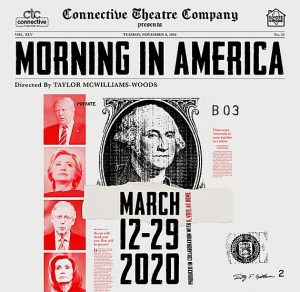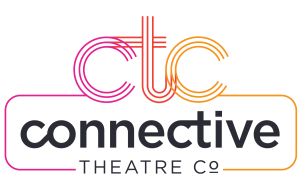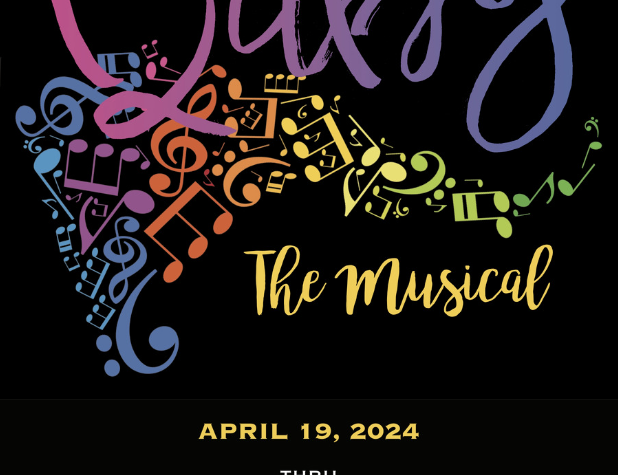
 [rating=4]Thoughtful discussion of issues that face our country must prevail over strictly emotional responses. This is one important takeaway from the brand-new show “Morning in America.” The original script by playwright, producer, and director Taylor McWilliams-Woods is a razor-sharp, disconcertingly relevant, and up-to-date discourse for our times. Based on compiled responses from thirty interviews about our current political situation in America, the presentation lays bare the various cleavages and divisions currently existing in this country since the election of President Donald J. Trump in 2016. The result is an astute concatenation of widely varying political opinions using the exact words spoken by the interviewees themselves.
[rating=4]Thoughtful discussion of issues that face our country must prevail over strictly emotional responses. This is one important takeaway from the brand-new show “Morning in America.” The original script by playwright, producer, and director Taylor McWilliams-Woods is a razor-sharp, disconcertingly relevant, and up-to-date discourse for our times. Based on compiled responses from thirty interviews about our current political situation in America, the presentation lays bare the various cleavages and divisions currently existing in this country since the election of President Donald J. Trump in 2016. The result is an astute concatenation of widely varying political opinions using the exact words spoken by the interviewees themselves.
The show begins with the overarching question: Why did so many people vote for Donald Trump versus Hillary Clinton? Following that, the playwright examines how Trump supporters and detractors feel about the job that he is doing as President. This scenario morphs into discussions of many hot-button issues, such as the Black Lives Matters Movement, the MeToo Movement, immigration from south of the border, school shootings, the second amendment’s right to bear arms, and so on and so forth. The play is as current as the recent Iowa caucuses and the vote tallies of Bernie Sanders and Pete Buttigieg.
This type of production is called “documentary theatre.” It is similar to what academic sociologists call ethnography or ethnographic research. Conducting interviews or focus groups with a representative sample of respondents allows the  researcher to gauge attitudes about a salient set of issues and policies. Answers to meaningful questions can then be grouped into categories to highlight both average and outlier opinions. This type of analysis is often done by major research organizations and think-tanks to get polling data for use by political candidates but also to take the temperature of the nation: to see where we are and where we may be going. McWilliams-Woods, however, goes a step further by turning this data into a highly perceptive and entertaining performance, using a cast of six. The actors are Grace Kayla Higbee (Grace), Kade Cox (Logan), Dani Pike (Delaney), Daniela Martinez (Noah), Cian Evans-Grayson (Cian), and Lucas Matteson (Tanner).
researcher to gauge attitudes about a salient set of issues and policies. Answers to meaningful questions can then be grouped into categories to highlight both average and outlier opinions. This type of analysis is often done by major research organizations and think-tanks to get polling data for use by political candidates but also to take the temperature of the nation: to see where we are and where we may be going. McWilliams-Woods, however, goes a step further by turning this data into a highly perceptive and entertaining performance, using a cast of six. The actors are Grace Kayla Higbee (Grace), Kade Cox (Logan), Dani Pike (Delaney), Daniela Martinez (Noah), Cian Evans-Grayson (Cian), and Lucas Matteson (Tanner).
The title “Morning in America” is taken from a one-minute television commercial that was a part of President Ronald Reagan’s re-election effort in 1984. In it, he announces the dawning of a new day: a prouder, stronger America which he had (presumably) implemented during his first term in 1980. Giving him a second term would thus continue this sort of national policy. But in McWilliams-Wood’s “Morning in America” script, the reference takes on additional meaning. In 2020, we are at roughly the same juncture as to the possible re-election of the incumbent President. The similarity here is that while the Reagan Administration had set the proverbial ball in motion (by creating policies leading to the increased polarization of our nation into rich and poor, and that of public opinion), the proverbial chickens have finally come home to roost some decades later, that is, during the Trump Administration.
At the very end of the show, there is some optimism that national divisiveness is just a blip in our history and that our country will get over it—and come back together stronger as one people with a common sense of purpose. But the last person on stage is the Trump advocate, who knows full well that President Trump and his supporters are currently in control and have done their best to make Congress into a seemingly do-nothing and rubber-stamp branch of government by investing more power and authority into the executive branch.
McWilliams-Woods’ fine directing makes a controversial and highly conversational play extremely watchable. The smoothly choreographed movements of the actors throughout the minimal/nonexistent, black-curtained set works well in highlighting each person’s mindset. As the characters express their viewpoints, they continually move around on the “theatre-in-the-oblong” stage and assemble and reassemble the various box-props that serve as seats, lecterns, and tables. This constant activity gives energy to the presentation, especially in those instances when those with conflicting or competing points of view share the same space. This minimalist approach to staging also makes the production very flexible so it can easily be taken on the road if need be.
The only drawbacks are these: Lighting design could be somewhat improved. There is an absence of fill lights during portions of the show; these could have helped different parts of the audience see the action better from various angles. Sound design is lacking. The recorded music beforehand is much too loud so that one cannot easily speak to one’s neighbor above the din. The worst thing, however, is the lack of an exit sign in the theater in case of emergency. (There is literally a blackout at one point when all the lights are turned off.) Finally, because the elevator was out of order, I had to climb four sets of stairs to get to the fourth floor of an older building with tall ceilings. Yes, there were signs directing patrons to the freight elevator and a nice sign explaining its operation, but that was hardly a solution. Not only was the warehouse-type elevator difficult to operate—I tried—but opening its doors would have caused unneeded back strain, which shouldn’t be a part of our admission. Yet it was well worth the climb to see the production, which was enjoyable and timely. Just remember that you need to press the button for “Nox Arca” to get into the front door of the building.
Earlier in the day, I had gotten a memo stating that “Morning in America would run for this weekend only, with the last performance being this Sunday’s matinee. It would then be postponed for the duration of the coronavirus. These days, the experts are telling us to expect a tidal wave of active cases, but hopefully our small boats might experience only a small wake. This, however, is in terms of the disease itself: The contagion has already had the ripple effect of turning our entire economic, cultural, and civic life topsy-turvy in ways that none of us could have imagined just a few months ago—or predicted even a day ago. This is where the deeper message of “Morning in America” is essential: It means opening up a dialogue with others whom we may disagree with in order to better understand their family background, religious and social values, and their daily lives. It also means analyzing what these individuals say as objectively as possible and working to find common ground. This is important if our goal is to heal the underlying divisions in our national values, above and beyond the specifics of politics and policy at the present moment.
“Morning in America” by Connective Theatre Company is currently playing at Nox Arca, 4001 N. Ravenswood, Chicago, through Sunday, March 15th. Subsequent weekend performances have been cancelled due to the coronavirus. The run will resume as scheduled should the current situation improve over the next few weeks. Please check the website connectivetheatrecompany.com regularly for additional information.
Tickets are $15 online and $20 at the door, and are available at connectivetheatrecompany.com.
Performances this weekend are:
Sunday – 3:00 p.m.
Note that “Morning in America” is produced in partnership with IL Vote at Home, a grassroots organization dedicated to increasing voter turnout.
To see what others are saying, visit www.theatreinchicago.com, go to Review Round-Up and click at “”Morning In America”.







More Stories
“How to Know the Wild Flowers: A Map” reviewed by Julia W. Rath
“Baby: the Musical”
“Nana” reviewed by Jacob Davis